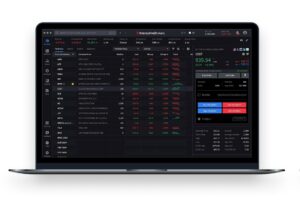The following is a guest editorial courtesy of Oscar Chu, Head of Business Intelligence at Finalto, an innovative prime brokerage that provides bespoke fintech and liquidity solutions.
Software is eating the world. Venture capitalist Marc Andreessen’s assessment has come to be seen as prophetic. Andreessen correctly intuited the way that software was transforming businesses from the inside and driving the creative destruction of moribund industries.
“Today, the world’s largest bookseller, Amazon, is a software company,” Andreessen wrote in 2011. By which he didn’t simply mean that a technology company had a lucrative sideline in ink and paper. Rather, “its core capability is its amazing software engine for selling virtually everything online, no retail stores necessary.”
Fast forward a decade and a half, and that transformation has been achieved at scale. Software has transformed traditional industries into software businesses and fundamentally shifted our ways of engaging with the world. Travel agents are now complex algorithmic data engines, neobanks have transformed day-to-day financial management into a data-powered, real-time digital experience, and supply chains are optimised for e-commerce.
In today’s software-driven global economy, it’s tempting to view AI as simply the next step in technology’s evolution. After all, nearly every company is now, in some sense, a software company, and soon, they’ll all need to become AI-enabled software companies.
The new user experience paradigm
That framing risks overlooking something deeper. AI isn’t just transforming software, it’s reshaping our relationship with hardware. This is where the metaphor of “software eating the world” becomes useful.
Because now, AI is eating software.
This isn’t a claim about AI’s raw power or a prediction about productivity gains. We can remain agnostic on those points while still recognising the qualitative shift underway.
Consider search. Increasingly, people are turning to large language models as their first stop for information. Digital marketing professionals are already grappling with a shift from Search Engine Optimisation (SEO) to Generative Engine Optimisation (GEO).
It’s natural to assume this is just another layer on top of existing processes. But what happens when the entire e-commerce journey, from discovery and evaluation to purchase, payment, and fulfilment, becomes mediated by AI? This isn’t science fiction, it’s already happening. Payments giant Stripe is partnering with OpenAI to enable purchases directly through ChatGPT. PayPal and Google have announced similar initiatives, marking the beginning of full integration between marketplaces, payment systems, and AI interfaces.
Or consider how workflow is transforming in financial markets. Sophisticated investors can already automate trading decisions, using advanced robot models. What happens when AI democratises financial automation, bringing professional-grade tools to ordinary investors?
For now, most of us experience AI through a browser window on an operating system. But how long before, as Elon Musk suggests, “devices will just be edge nodes for AI inference”? When that happens, the distinction between hardware and software starts to blur.
Training data: new frontiers
We may be on the cusp of a paradigm shift in how we treat the data that powers AI. Until now, progress has relied on training models on vast datasets, an approach that has delivered remarkable results but at immense cost. Are the returns diminishing? OpenAI cofounder Ilya Sutskever suggests so, likening data to fossil fuels: a finite resource nearing depletion.
On the contrary, this makes high quality data ever more important. Emerging agentic models could even refine their own training data, creating a continuous feedback loop that improves both datasets and outputs.
For Finalto’s BI team, we recognise the importance of data quality. This readies Finalto for a foundation of trusted insights, advanced analytics, and actionable intelligence for clients. These advances also require ongoing oversight, ensuring that inputs and outputs remain accurate, transparent, and fair. In short, data management is evolving from a static task to a dynamic, strategic process.
Investing in adaptability
In short, the AI revolution doesn’t simply mean new tools or increased productivity. It’s a profound shift in the way we engage with technology. Every business must invest in the future to stay competitive. At Finalto, we’re fortunate to benefit from a diverse skill set and organisational agility. Our BI team and data users collaborate closely, sharing insights, and we’re supported by the expertise of our in-house software development team.
But that doesn’t mean we can afford to be complacent. Drawing on my experience leading Finalto’s BI team and working across departments, I’d like to share three key lessons we’ve learned as we prepare for the AI-driven future:
1. Invest in talent
Somewhat ironically, human skills are critical for successful AI implementation. When your business is no longer relying on proven, standardised, failsafe enterprise software packages, human judgment and creative intelligence become even more important.
At a more technical level, implementing advanced data management and cloud computing strategies is highly complex, requiring specialist knowledge and a willingness to learn and adapt as technology evolves.
2. Strategically scale up digital infrastructure
Managing massive amounts of data involves a huge amount of computational power. Companies will need access to significant computing infrastructure. Equally importantly, they need an appropriate scaling strategy to effectively makes use of this infrastructure. It’s why Finalto has implemented Databricks as our unified data and analytics platform, with significant talent and resources devoted to developing tools and processes to enhance data-driven insights and decision making.
Our investment in Databricks enables Finalto to harness scalable cloud computing, integrate machine learning and AI, and leverage cutting-edge data innovations, such as Apache Spark, and open table formats. In practice, this translates into scalable infrastructure, stronger internal data management, richer insights, and enhanced client service.
3. Establish best practice
Every financial services company needs to start thinking about AI best practices to stay competitive and responsible. At Finalto, we’re leading this effort by implementing processes for data architecture, quality monitoring, CI/CD, and governance, all while investing in the talent to implement these systems effectively.
Integrated AI strategies
Readers will appreciate that these three points are closely interconnected, comprising an integrated AI strategy, building the best team to leverage the power of cloud-based data management according to the established and emerging best practices
We continue to evolve our approach, but one lesson stands out for financial services firms: long-term competitiveness depends on investing in the future.
Oscar Chu is Head of BI at Finalto an innovative prime brokerage that provides bespoke fintech and liquidity solutions. Finalto deliver best-in-class pricing, execution and prime broker solutions across multiple assets, including CFDs on Equities, Indices, Commodities, Cryptos and rolling spot FX, Precious and Base Metals, and bespoke products such as NDFs.
All opinions, news, research, analysis, prices or other information is provided as general market commentary and not as investment advice and all potential results discussed are not guaranteed to be achieved. The information may have been derived from publicly available sources, company reports, personal research, or surveys. Past performance is not indicative of future performance. Trading carries risk of capital loss. Service available to professional clients only.









